
Freedom News Freedom News writes and shares posts that are of Interest to a broad demographic . Articles are to be taken on a individual basis and not under the assumption that different Authors and content providers and Horwich Nationalist as well share the same opinions. Articles copied are fully attributed to Authors under international fair use acts. .
Search This Blog
FREEDOM NEWS HOME PAGE
Friday 28 October 2022
The Markets Elect Our New Prime Minister - Irreverend Episode 99
Patient Reform in the Globalist American Empire

Patient Reform in the Globalist American Empire
Republished in entirety from the Theopolis Institute
American Christians presently live in a world that is a mix of the Soviet Union, the Weimar Republic, Children of Men, and Idiocracy.
You may think this is an overstatement but it is not. We are experiencing an intense acceleration of very long-term societal decline—economic prospects for young people are below what their grandparents enjoyed, public services which had been taken for granted are beginning to disappear, bridges are collapsing, highways are increasingly in disrepair, the ruling regime enjoys total authority of the lives of its subjects, it has locked them in their homes, shut down their businesses, closed their churches, and forced them to submit to medical experimentation to maintain employment. It has arrayed the full force of the security state against disfavored political figures, engaged in farcical election seasons of ballot harvesting in lieu of lawful elections, it has legally mandated that sodomy be celebrated as though it were holy matrimony. The insanity of transgenderism is treated by all our institutions as perfectly sane and licit, even to the extent that children are having their genitals mutilated by renowned physicians at our most revered medical institutions. All of this has happened so fast that you might not fully comprehend just how bad things really are.
It is at this moment that Christ’s church desperately must begin preaching and living the victory of Jesus Christ in a world that has gone absolutely mad. It is in precisely such a world that the wisdom of the Epistle of James is so badly needed to guide us, particularly when it is understood within the context that Pastor Jeff Meyers presents us with in his recent commentary, Wisdom for Dissidents. Meyers’ thesis is that James was written very early by the Apostle James, and was therefore written for Christians undergoing intense persecution by the Jews which caused them to be tempted to respond with either violence (James 3:13-16; 4:1-12) or appeasement (2:1-13).
If Meyers’ persuasive thesis is correct, James is not a random collection of Christian wisdom like a New Testament Book of Proverbs, but rather given for a very specific purpose within a very specific context. And if we read it in this context, it will present us with wisdom that is applicable in our own day, which is strikingly similar to the early Jerusalem church, despite 2000 years of time between us.
On the one hand, in the ostensibly conservative evangelical church today, most of the most notable leaders, the famous pastors of influential churches, the prominent seminary leaders and other intellectuals have maintained a posture of appeasement forged during the time period Aaron Renn calls “neutral world.” They proudly countersignal so-called MAGA evangelicals, accusing them of political idolatry, and make sure to signal their loyalty to the pieties of the ruling regime, perfomatively denouncing “racism” and “misogyny” and some even going so far as to tell Christians it is their duty to practice “pronoun hospitality.”
But as Renn so rightly demonstrates, we are no longer in “neutral world.” We are very firmly within “negative world,” and evangelicalism is clearly fracturing along what seems to be political and ideological lines. In reality, the divisions go much, much deeper. Christian institutions that sold their birthright for a mess of pottage in the neutral world have lost tremendous credibility among the laity who are now in search of new leadership who are adapted to the challenges of negative world.
That new leadership faces the opposite temptation in negative world. The temptation will be to ratchet the anger up to an 11, because the things an insane Weimerican culture is doing should make you angry. There is a great deal to appreciate and apply in Dr. Alastair Roberts’ very good article in this Theopolis Conversation, but the greatest concern is just how much he understates how bad things really are.
We have reached the point in civilizational decline where we have industrialized the genital mutilation of children. Under such conditions, and when a president with tenuous legitimacy decries tens of millions of his opponent’s supporters as “fascists,” it is very likely that at some point in the near future they will eventually begin to live up to what is now frivolous slander.
To those with eyes to see, the only thing holding back violent reaction is the historic levels of prosperity Americans have enjoyed since the Second World War, which has begun to noticeably decline. If this managed economic decline were to ever drop off a cliff, what would happen? What would happen when the angry Trump-supporting Middle American Radical no longer can just grill and watch NFL football under his own vine and fig tree? What happens when he can no longer pay his mortgage and feed his family? There will be wars and fights among you.
The great danger is then, twofold. First, the church cannot understate just how bad things are. Nearly all our leaders and important institutions have bled away all their credibility in their pursuit of neutral world legitimacy. Continuing to pretend things aren’t that bad will only signal to people desperate for strong leadership that we will be incapable of providing it. There are tens of millions of evangelical sheep without shepherds, who are used to hirelings leading them to the slaughter. We cannot sound indistinguishable from the hirelings and wolves. We must denounce the great wickedness taking place in no uncertain terms: “For if the trumpet makes an uncertain sound, who will prepare for battle?” (1 Cor. 14:8). Our people will need leadership or they will find ungodly leaders who will indulge their natural desires for wrath and vengeance.
But, once we begin to lead boldly against these great evils, the other temptation will become extremely powerful. This is where Wisdom For Dissidents is of its greatest importance. We must also be extremely clear to denounce violence in all forms. Witnessing great evils will cause anyone’s anger to boil over, and it is only the gospel of Jesus Christ that can restrain the fury of man that is being built up. We have to be able to say to our people, “no you are not wrong to be upset by these things. It would be wrong if you weren’t. But the wrath of man will not produce the righteousness of God.”
Time and time again in the Scriptures, the great evils that were done in Israel were not corrected by men “rising up and putting things right,” but by God acting in totally unexpected ways. Revolution against evil systems only produces systems under the control of revolutionaries. The Christian is called to patient reform over generations. We are called to patiently await God to act, for Him to bring justice, and while we wait, build a mature, orderly, patient, peaceful, virtuous people who are capable of ruling.
The temptation to be an Absalom or Jeroboam will be powerful, but God has called us to be Jacobs and Josephs. We will suffer under these great evils, and our leaders must be ready and equipped to lead us to live a quiet and peaceable life even when an evil regime has made leading a quiet and peaceable life illegal. But a patient people, who are committed to Christlike life, who are devoted to a lifetime of worship, and who are prepared to endure great hardship, are a people who will overcome and who will conquer. If you want to know how Christ would have you overthrow the Globalist American Empire, Wisdom For Dissidents is the handbook.

Andrew Isker is the pastor of 4th Street Evangelical Church in Waseca, MN. He is a graduate of Minnesota State University and Greyfriar’s Hall Ministerial Training School, and he has served churches in Missouri, West Virginia, and Minnesota. He is the author (with Andrew Torba) of Christian Nationalism, and the author of the forthcoming book, The Boniface Option. Andrew, his wife Kara, and their five children reside in his hometown of Waseca, MN. He can be found on Gab @BonifaceOption.
Published in Bold Christian Writing and Christian Nationalism
Thursday 27 October 2022
‘Hypocrisy is too small a word’ | Neil Oliver on people who ‘cheered masters of disaster’
The Truth About Eco-Warriors
Wednesday 26 October 2022
White Slums of South Africa | Reggie Yates Extreme | Real Stories
feminist in their hatred of Men and the family and Christianity become lonely
feminist in their hatred of Men and the family and Christianity become lonely
Many feminist in their hatred of Men and the family and Christianity often quote << Ephesians 5 >> "vs22 Wives, submit yourselves unto your own husbands, as unto the Lord. 23 For the husband is the head of the wife,".
As from the bible in order to distort the view of Christianity on the relationship between the roles of men and women within marriage and society . But what they fail to do is to use the following scripture to show the true relationship between men and women within marriage.
25 Husbands, love your wives, even as Christ also loved the church, and gave himself for it; 26That he might sanctify and cleanse it with the washing of water by the word, 27 That he might present it to himself a glorious church, not having spot, or wrinkle, or any such thing; but that it should be holy and without blemish. 28 So ought men to love their wives as their own bodies. He that loveth his wife loveth himself. 29 For no man ever yet hated his own flesh; but nourisheth and cherisheth it, even as the Lord the church:
As for my own example the day my wife declared me her lord that day she made me a King and automatically she made herself a Queen, to be treated with all due honour respect and due dignity to a lady of that rank. She in effect made me her servant who's duty was to take all responsibility for her, to protect and to provide all things that would make her life happy and complete.
And that it marks a vast contrast from the distorted view they like to give about about the roles within marriage and Christianity , It is always amusing how these so called sisters in feminism never seem to raise objections to the way women are treated within the Islamic doctrine also. perhaps it is because they have become so bitter that their self pride cannot bear hear them say to some one they could love " I love you with all my heart , and I respect and honour you above all men, and I will obey you in all decisions on our future you make. And in effect make themselves servants of a bitter loneliness . Instead of realising by Making me King you Make yourself a Queen!
Wednesday Dialogue - Hello, Unknown with Jonathan Wright
Monday 24 October 2022
The Dangers of Democracy
Dangers of Democracy
The word “democracy” appears exactly zero times in the United States Constitution. And yet, no form of government is celebrated with the same fervency as democracy. Recently, the phrase “Our Democracy” has been co-opted by nearly every politician as an attempt to appeal to the populace’s supposedly unshakeable faith in the voting process. Appeals to the fragility of “Our Democracy” are commonly made by political figures hoping to discredit rivals; rivals they unhesitatingly accuse of threatening that ancient Athenian inheritance. A keen extraterrestrial might conclude that many of the developed nations of the world embrace democracy as religion.
But is this unquestioning reverence for a form of political governance healthy, reasonable, desirable? Does such reverence blind us to the shortcomings that democracy may possess relative to other political arrangements and lure us into complacent, even dangerous, self-satisfaction?
Let’s review a few of the major issues that beset democracies. The aim is not to condemn democracy as a form of governance, but to critique it such that we may be better informed of its imperfections. After all, politics of any form must involve human beings and human beings, despite their best intentions, are far from perfect.
1.) Democracy is only as Noble and Reasonable as its Voting Citizens
The first critique of democracy concerns the responsibility that citizens have to exhibit character in daily life and to stay well informed about the issues for which they vote. It does not matter how passionately a citizen may feel about a particular issue; if that passion is not tempered by objective investigation and the application of reason to the issue at hand, the voter abdicates a central responsibility as a citizen. No degree of passion is a substitute for clear-headed thinking. Understanding well the tendency that democratic citizens have towards this failure, Winston Churchill once quipped, “The best argument against democracy is a five-minute conversation with the average voter.” Unfortunately, many citizens of modern democracies fall prey to emotional pleas and assume that heartfelt emotion is sufficient to guide ones voting decisions. The media, with that oh-so-dangerous self-satisfaction, appeals to the smug assuredness of over-confident voters through emotionally manipulative means. The voters are constantly reassured that their viewpoint is the only reasonable one.
Democracy has yet to find a solution to the Dunning-Kruger effect, the phenomenon where the less a person knows about an issue, the more confident a person is in their knowledge about the issue. A 2018 study by Ian G Anson published in the journal Political Psychology investigated how the Dunning-Kruger effect affects citizens’ perceptions of their political knowledge. Anson examined over two thousand American adults via two online surveys which quizzed the participants on basic political knowledge. Most participants of the study performed poorly and those who performed poorest were more likely to be confident in their knowledge of politics than those that performed well 1.
The Dunning-Kruger effect, combined with patronizing and pandering from politicians and the press, results in a poorly informed, but highly opinionated public. A hyper-emotional public is incapable of cool-headed, rational debate and is, instead, prone to political provocation and manipulation by media and power-hungry politicians.
A successful democracy requires citizens to continuously revisit and revise their understanding of core issues in a level-headed manner. Such revision is best embarked upon with temperance and reason.
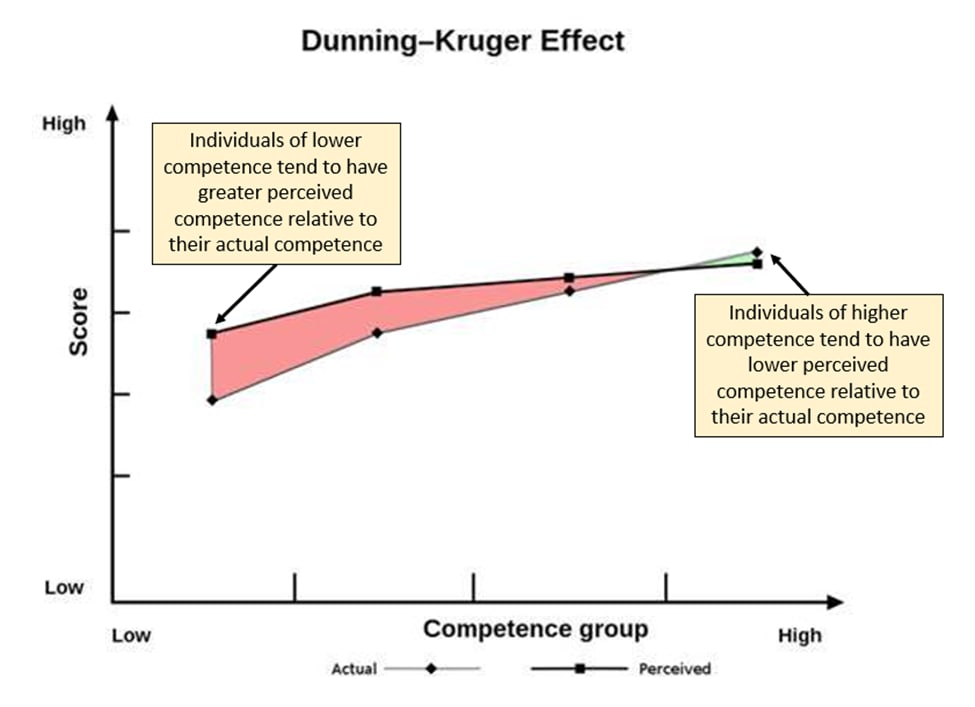
2.) Democracy Makes Neighbors Political Adversaries and Makes All Issues Political
A less considered shortcoming is the tendency for democracies to create adversity between citizens who hold differing political opinions. In the United States, this adversity has become so intense between Republicans and Democrats that distrust between members of opposing parties extends far beyond just political issues. Nearly every issue brought to the public eye, whether science, sports, movies, or music becomes irreversibly burdened with political interpretation, intention, and influence. Ideas and concerns submitted by one side of the political aisle are a priori rejected and condemned by the other side before the slightest consideration of the idea’s merits. This effect may be particularly amplified in a democratic political system where there are only two major parties. Then, nearly every political issue inherits a kind of adversity that is more likely to be absent when the number of available choices exceeds two.
The recent COVID-19 pandemic emphasizes the need to be aware of the tendency people have to view apolitical issues through partisan lenses. As thoughtful citizens we should be cognizant of this tendency when evaluating actions to take to solve these issues. A June 2020 article from FiveThirtyEight detailed the divergence of experiences between Republicans and Democrats during that time2. Republicans generally exhibited less concern about the pandemic while Democrats exhibited greater concern about it. The intent of this article is not to determine which political party was correct or incorrect about the pandemic, but to demonstrate how partisan politics played a crucial role in shaping people’s viewpoints about a major issue. One would presume that the pandemic should never have been a political issue. Instead, the pandemic and its mitigation efforts should have been matters of public health and science.
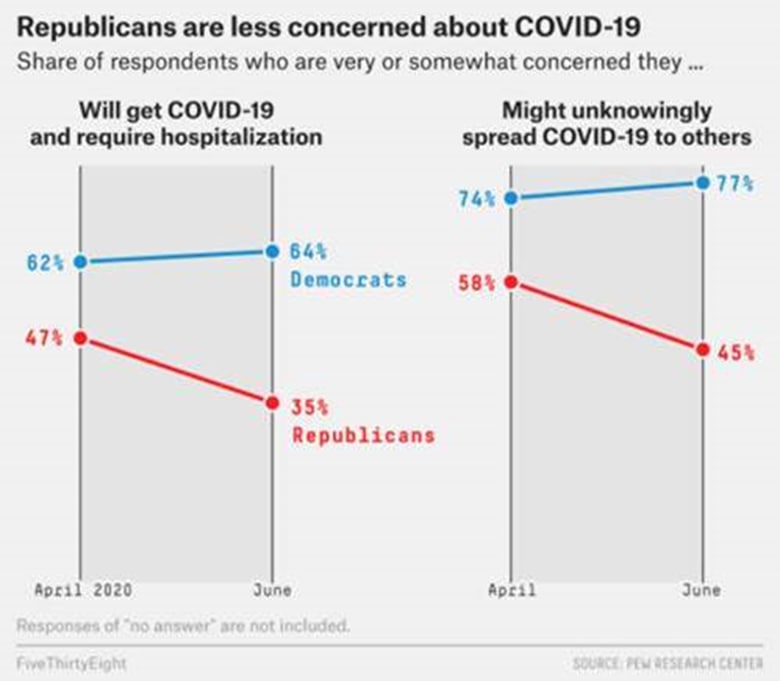
Ideally, an open scientific investigation and discussion should have been facilitated to find the best solutions to counter the pandemic while maintaining the minimum possible obstruction of freedoms upon citizens. Instead, political parties championed separate causes and blamed the opposition for any and all Covid-19 deaths. This turned the opposing party into literal “murderers” while one’s own party used these deaths to lobby for votes.
This is not to say that there were no valid issues that were brought up during the political chaos. Examples of valid points of disagreement included masking policies, vaccination mandates, lockdowns, and experimental drug treatments. However, actual open scientific debate on these issues was rarely carried out.
The COVID-19 pandemic response is just one example of where the political divide contaminates problem-solving and leads to further distrust between those that share different political opinions. As the political divide in America (and across the West) widens, more and more aspects of society become political, from sports to music to education. Nearly every aspect of life now contains political undertones, which only divides us further and makes cordial political dialogue near impossible. The U.S.’s current circumstance stands as an example of the tendency for democracies to politicize everything and divide its citizenry.
3.) Democracies Incur Great Opportunity Costs
Another drawback of modern democracy is the immense opportunity cost incurred by political campaigns. Time, money, energy, and attention are all consumed by political parties vying to ensure that their candidate is elected. Dozens, hundreds, and sometimes even thousands of people are employed for hours, days, and weeks to assist with a campaign on behalf of a candidate. And consider the fact that in a two-party system, one of these parties’ efforts will effectively be for nothing if it loses. Not only are political campaigns expensive, but they are also getting increasingly MORE expensive. In 2016 the total cost for presidential and congressional races was $7 billion. By 2020 that number doubled to more than $14.4 billion3.
Let’s consider what alternative investments could be made with $14.4 billion. For $400,000 each, $14.4 billion could buy 36,000 homes. Researchers from 23 countries suggest that $14 billion is the additional expenditure needed each year to eradicate world hunger by 2030. The National Cancer Institute estimates that the average cost of first-year cancer treatment is $42,000 4. At this price tag, $14 billion is enough to purchase a year’s worth of cancer treatment for over 330,000 people. Clearly, the extraordinary sums of money spent on political campaigns could be used for a variety of beneficial endeavors. These endeavors could have lasting, meaningful effects on the lives of countless people.
In addition to the monetary cost of campaigning, political involvement incurs a devastating mental toll on losers of election races. Regarding the 2016 presidential election, analysis suggests that in states that voted for Hillary Clinton in November 2016, there were a total of 54.6 million more days of poor mental health than in October 2016 5. Poor mental health leads to lower quality of life and lower productivity. Though poor mental health isn’t exclusive to democracies, it is a heavy opportunity cause to risk the mental health of half the country each election cycle. This problem is particularly strong in winner-take-all elections as in presidential races.
Another significant cost in democracies is the time and energy the politicians spent on campaigning and fundraising for the next election cycle. Not only must politicians work to enact new legislation, but they must also devote considerable resources to ensuring they maintain popular public opinion and are prepared financially for their upcoming reelection campaign. This diverts time, energy, and attention from passing legislation to lobbying voters and campaign donors. According to Rep. Rick Nolan in “60 Minutes” expose from CBS, members of Congress are encouraged to spend thirty hours per week in call centers for their respective parties asking for donations:
Rep. Rick Nolan: “Thirty hours is what they tell you you should spend. And it’s discouraging good people from running for public office. I could give you names of people who’ve said, “You know, I’d like to go to Washington and help fix problems, but I don’t want to go to Washington and become a mid-level telemarketer, dialing for dollars, for crying out loud.”
Interviewer: “You’re saying members of Congress are becoming like telemarketers?”
Rep. Rick Nolan: “Well, 30 hours a week, that’s a lot of telemarketing. Probably more than most telemarketers do.”
This emphasis on fundraising also results in fewer good people running for office according to Nolan – another opportunity cost of the current democratic process. 6
While political engagement is necessary for a functioning democracy, this engagement can incur a heavy cost on the people it purportedly serves. Current democracies risk turning politics into an industry unto itself. When the democratic process becomes an industry unto itself, it ceases to act on behalf of the people and instead serves the political actors.
4) Democracy is Expensive and Politicians Push Costs to Future Generations
The fourth flaw of democracy is the tendency for democracies to become more expensive over time as citizens vote for additional benefits from the government. Once a benefit is provided to citizens they will rarely vote to remove this benefit, especially when it is financed through tax dollars. This is particularly true when the benefit has been provided for several generations. Over time, this leads wealthy societies to become more dependent on the government to provide for the citizenry. Alexander Fraser Tytler, an influential professor of universal history in the 18th century and an expert on the rise and fall of civilizations summarized this tendency:
“A democracy cannot exist as a permanent form of government. It can only exist until the voters discover that they can vote themselves largesse from the public treasury. From that moment on, the majority always votes for the candidates promising the most benefits from the public treasury with the result that a democracy always collapses over loose fiscal policy, always followed by a dictatorship. The average age of the world’s greatest civilizations has been 200 years. These nations have progressed through this sequence: From bondage to spiritual faith; From spiritual faith to great courage; From courage to liberty; From liberty to abundance; From abundance to selfishness; From selfishness to apathy; From apathy to dependence; From dependence back into bondage.” 7
-Alexander Fraser Tytler
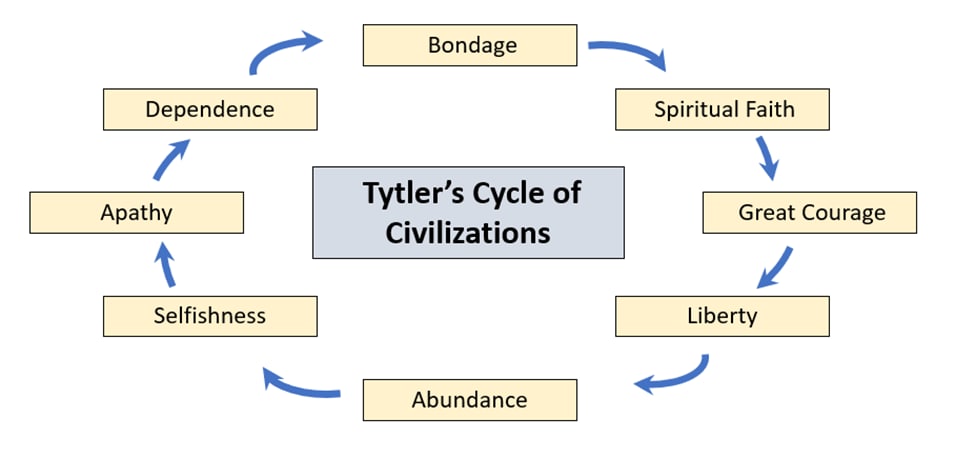
Tytler suggests that civilizations emerge out of hardship through great faith and courage. This struggle ultimately leads to liberty and abundance in which citizens are largely free to act as they see fit. But while desirable in their own right, liberty and abundance lead to selfishness and apathy when not tempered by discipline. Finally, when in a state of material wealth, a civilization returns to a state of dependence in which the citizenry chooses welfare and handouts over personal responsibility. This allows tyrants to exploit complacent citizens through false promises which leads to the final stage, the stage that defines most of human political history: bondage. Aristotle formulates Tytler’s cycle succinctly:
“Inevitably, masculine republics give way to feminine democracies, and feminine democracies invariably give way to tyranny.”
-Aristotle
And the prolific historian Will Durant summarized this phenomenon even more simply:
“A civilization is born Stoic and dies Epicurean.”
-Will Durant
This trend toward dependence is evident in the amount of debt a democratic nation accrues. Consider that nine of the ten most indebted nations are considered democracies by the World Population Review 8,9. Only the tiny Asian nation of Bhutan (considered a “hybrid regime”) is not considered either a flawed or full democracy. The graph below demonstrates that democracies are particularly prone to spending beyond their means. Debt is money borrowed from future generations to pay for the expenses of the current generation. By voting themselves benefit after benefit, citizens vote themselves into being financial liabilities. These liabilities are expected to be paid for by future generations, creating an unsustainable financial trajectory. As we have seen from Tytler’s cycle of civilizations, this unstable financial path can then be exploited by opportunists willing to bribe citizens with additional benefits in exchange for their freedom. This results in a reduction of liberty and prosperity in society.
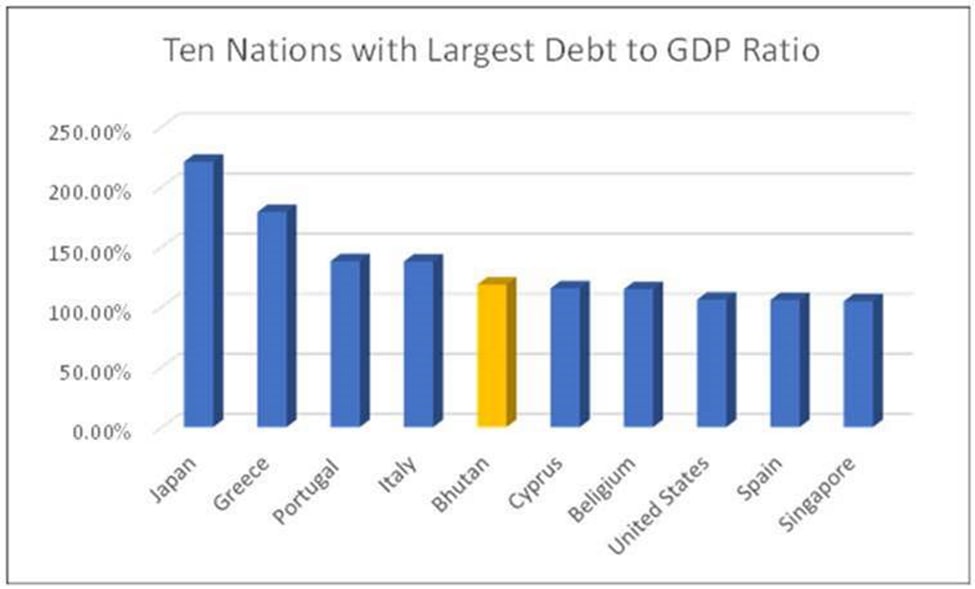
The politicians who make grand promises to their constituents rarely pay the cost incurred by said promises. Instead, future generations foot the bill for policies that were often passed simply to gain temporary public approval. Sly politicians prey upon the shortsightedness and emotionality of voting citizens, ultimately buying votes with hard-earned capital from future generations.
Conclusion
In conclusion, democracies come with flaws like all forms of government. Democracy’s tendency to reflect the vices of their citizenry and pit citizens against each other means that democratic nations should focus on the education and ethics of their populaces. Consequently, their voters can make informed and moral choices when selecting elected leaders. The high opportunity cost of political campaigns and the propensity for democracies to accrue large amounts of debt is also a serious flaw in democratic governments. Laws that limit campaign contributions and government spending constraints could mitigate these issues, though this is easier said than done. Voters and representatives alike will need to be cognizant of future generations when considering any increase in government benefits.
Overall, no form of government is perfect. It can be trendy to ridicule democratic government given the current state of the western world. However, let us refrain from unreflective and reckless criticism. Perhaps Winston Churchill’s wise assessment of the system is most appropriate:
“Democracy is the worst form of government, except for all the others.”
-Winston Churchill
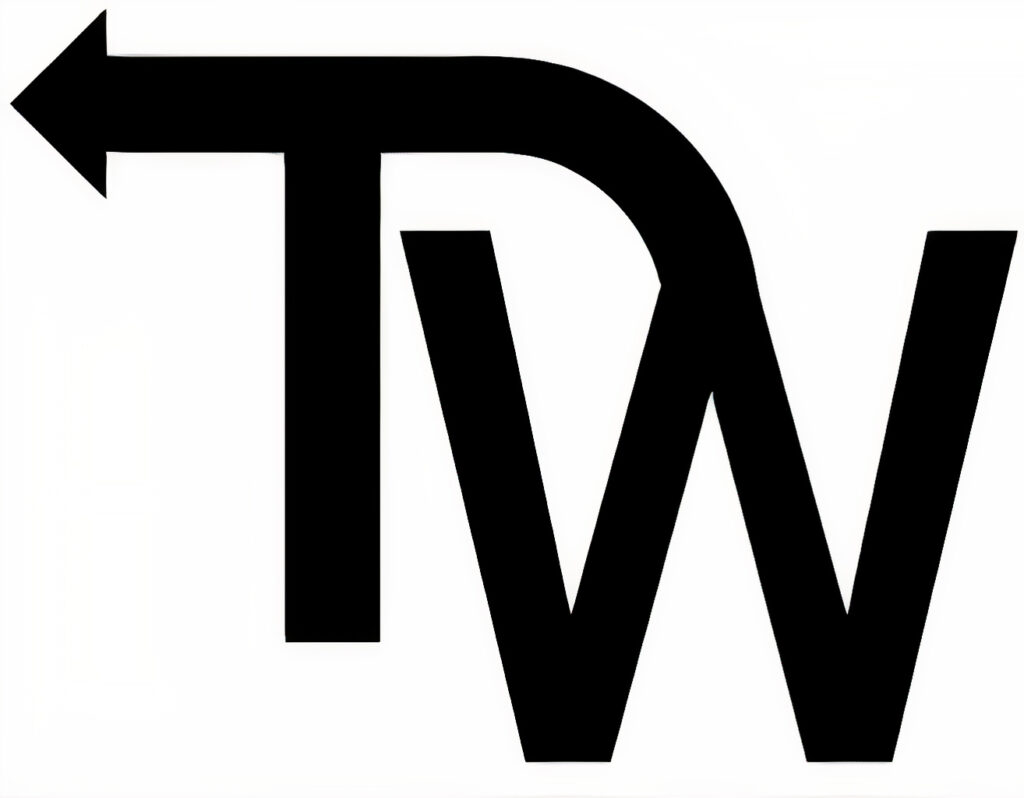
Thinking West aims to revive the “Great Conversation” in our digital age through promoting the study of the great books of the western world, classical approaches to education, and through thoughtful commentary on current events, history, philosophy, culture, education, and religion.
We strive first and foremost to spark an appreciation for the values that built the West. Our content strives for depth and meaning in an era plagued by six second attention spans and clickbait headlines. We challenge ourselves and our readers to read, reflect, and speak out on ideas that matter.
Footnotes:
[1] https://onlinelibrary.wiley.com/doi/abs/10.1111/pops.12490
[3] https://www.opensecrets.org/news/2021/02/2020-cycle-cost-14p4-billion-doubling-16/
[6] https://www.cbsnews.com/news/60-minutes-are-members-of-congress-becoming-telemarketers/
[7] https://www.goodreads.com/quotes/108530-a-democracy-cannot-exist-as-a-permanent-form-of-government
[8] https://worldpopulationreview.com/country-rankings/democracy-countries
[9] https://www.stash.com/learn/10-countries-with-largest-national-debt-to-gdp/
Published in Bold Christian Writing
